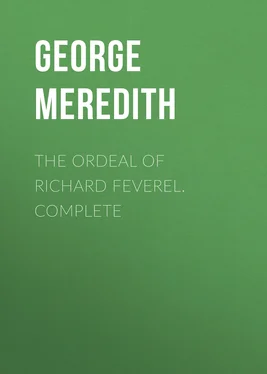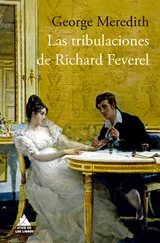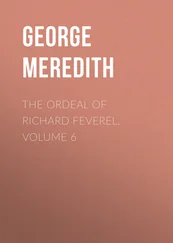George Meredith - The Ordeal of Richard Feverel. Complete
Здесь есть возможность читать онлайн «George Meredith - The Ordeal of Richard Feverel. Complete» — ознакомительный отрывок электронной книги совершенно бесплатно, а после прочтения отрывка купить полную версию. В некоторых случаях можно слушать аудио, скачать через торрент в формате fb2 и присутствует краткое содержание. Жанр: foreign_prose, literature_19, foreign_antique, на английском языке. Описание произведения, (предисловие) а так же отзывы посетителей доступны на портале библиотеки ЛибКат.
- Название:The Ordeal of Richard Feverel. Complete
- Автор:
- Жанр:
- Год:неизвестен
- ISBN:нет данных
- Рейтинг книги:4 / 5. Голосов: 1
-
Избранное:Добавить в избранное
- Отзывы:
-
Ваша оценка:
- 80
- 1
- 2
- 3
- 4
- 5
The Ordeal of Richard Feverel. Complete: краткое содержание, описание и аннотация
Предлагаем к чтению аннотацию, описание, краткое содержание или предисловие (зависит от того, что написал сам автор книги «The Ordeal of Richard Feverel. Complete»). Если вы не нашли необходимую информацию о книге — напишите в комментариях, мы постараемся отыскать её.
The Ordeal of Richard Feverel. Complete — читать онлайн ознакомительный отрывок
Ниже представлен текст книги, разбитый по страницам. Система сохранения места последней прочитанной страницы, позволяет с удобством читать онлайн бесплатно книгу «The Ordeal of Richard Feverel. Complete», без необходимости каждый раз заново искать на чём Вы остановились. Поставьте закладку, и сможете в любой момент перейти на страницу, на которой закончили чтение.
Интервал:
Закладка:
“Nor I much,” said Austin.
Richard had raised his head in the heat of his denunciation of poor Tom. He would have hidden it had he known the thought in Austin’s clear eyes while he faced them.
“I never met a coward myself,” Austin continued. “I have heard of one or two. One let an innocent man die for him.”
“How base!” exclaimed the boy.
“Yes, it was bad,” Austin acquiesced.
“Bad!” Richard scorned the poor contempt. “How I would have spurned him! He was a coward!”
“I believe he pleaded the feelings of his family in his excuse, and tried every means to get the man off. I have read also in the confessions of a celebrated philosopher, that in his youth he committed some act of pilfering, and accused a young servant-girl of his own theft, who was condemned and dismissed for it, pardoning her guilty accuser.”
“What a coward!” shouted Richard. “And he confessed it publicly?”
“You may read it yourself.”
“He actually wrote it down, and printed it?”
“You have the book in your father’s library. Would you have done so much?”
Richard faltered. No! he admitted that he never could have told people.
“Then who is to call that man a coward?” said Austin. “He expiated his cowardice as all who give way in moments of weakness, and are not cowards, must do. The coward chooses to think ‘God does not see.’ I shall escape.’ He who is not a coward, and has succumbed, knows that God has seen all, and it is not so hard a task for him to make his heart bare to the world. Worse, I should fancy it, to know myself an impostor when men praised me.”
Young Richard’s eyes were wandering on Austin’s gravely cheerful face. A keen intentness suddenly fixed them, and he dropped his head.
“So I think you’re wrong, Ricky, in calling this poor Tom a coward because he refuses to try your means of escape,” Austin resumed. “A coward hardly objects to drag in his accomplice. And, where the person involved belongs to a great family, it seems to me that for a poor plough-lad to volunteer not to do so speaks him anything but a coward.”
Richard was dumb. Altogether to surrender his rope and file was a fearful sacrifice, after all the time, trepidation, and study he had spent on those two saving instruments. If he avowed Tom’s manly behaviour, Richard Feverel was in a totally new position. Whereas, by keeping Tom a coward, Richard Feverel was the injured one, and to seem injured is always a luxury; sometimes a necessity, whether among boys or men.
In Austin the Magian conflict would not have lasted long. He had but a blind notion of the fierceness with which it raged in young Richard. Happily for the boy, Austin was not a preacher. A single instance, a cant phrase, a fatherly manner, might have wrecked him, by arousing ancient or latent opposition. The born preacher we feel instinctively to be our foe. He may do some good to the wretches that have been struck down and lie gasping on the battlefield: he rouses antagonism in the strong. Richard’s nature, left to itself, wanted little more than an indication of the proper track, and when he said, “Tell me what I can do, Austin?” he had fought the best half of the battle. His voice was subdued. Austin put his hand on the boy’s shoulder.
“You must go down to Farmer Blaize.”
“Well!” said Richard, sullenly divining the deed of penance.
“You’ll know what to say to him when you’re there.”
The boy bit his lip and frowned. “Ask a favour of that big brute, Austin? I can’t!”
“Just tell him the whole case, and that you don’t intend to stand by and let the poor fellow suffer without a friend to help him out of his scrape.”
“But, Austin,” the boy pleaded, “I shall have to ask him to help off Tom Bakewell! How can I ask him, when I hate him?”
Austin bade him go, and think nothing of the consequences till he got there.
Richard groaned in soul.
“You’ve no pride, Austin.”
“Perhaps not.”
“You don’t know what it is to ask a favour of a brute you hate.”
Richard stuck to that view of the case, and stuck to it the faster the more imperatively the urgency of a movement dawned upon him.
“Why,” continued the boy, “I shall hardly be able to keep my fists off him!”
“Surely you’ve punished him enough, boy?” said Austin.
“He struck me!” Richard’s lip quivered. “He dared not come at me with his hands. He struck me with a whip. He’ll be telling everybody that he horsewhipped me, and that I went down and begged his pardon. Begged his pardon! A Feverel beg his pardon! Oh, if I had my will!”
“The man earns his bread, Ricky. You poached on his grounds. He turned you off, and you fired his rick.”
“And I’ll pay him for his loss. And I won’t do any more.”
“Because you won’t ask a favour of him?”
“No! I will not ask a favour of him.”
Austin looked at the boy steadily. “You prefer to receive a favour from poor Tom Bakewell?”
At Austin’s enunciation of this obverse view of the matter Richard raised his brow. Dimly a new light broke in upon him. “Favour from Tom Bakewell, the ploughman? How do you mean, Austin?”
“To save yourself an unpleasantness you permit a country lad to sacrifice himself for you? I confess I should not have so much pride.”
“Pride!” shouted Richard, stung by the taunt, and set his sight hard at the blue ridges of the hills.
Not knowing for the moment what else to do, Austin drew a picture of Tom in prison, and repeated Tom’s volunteer statement. The picture, though his intentions were far from designing it so, had to Richard, whose perception of humour was infinitely keener, a horrible chaw-bacon smack about it. Visions of a grinning lout, open from ear to ear, unkempt, coarse, splay-footed, rose before him and afflicted him with the strangest sensations of disgust and comicality, mixed up with pity and remorse—a sort of twisted pathos. There lay Tom; hobnail Tom! a bacon-munching, reckless, beer-swilling animal! and yet a man; a dear brave human heart notwithstanding; capable of devotion and unselfishness. The boy’s better spirit was touched, and it kindled his imagination to realize the abject figure of poor clodpole Tom, and surround it with a halo of mournful light. His soul was alive. Feelings he had never known streamed in upon him as from an ethereal casement, an unwonted tenderness, an embracing humour, a consciousness of some ineffable glory, an irradiation of the features of humanity. All this was in the bosom of the boy, and through it all the vision of an actual hob-nail Tom, coarse, unkempt, open from ear to ear; whose presence was a finger of shame to him and an oppression of clodpole; yet toward whom he felt just then a loving-kindness beyond what he felt for any living creature. He laughed at him, and wept over him. He prized him, while he shrank from him. It was a genial strife of the angel in him with constituents less divine; but the angel was uppermost and led the van—extinguished loathing, humanized laughter, transfigured pride—pride that would persistently contemplate the corduroys of gaping Tom, and cry to Richard, in the very tone of Adrian’s ironic voice, “Behold your benefactor!”
Austin sat by the boy, unaware of the sublimer tumult he had stirred. Little of it was perceptible in Richard’s countenance. The lines of his mouth were slightly drawn; his eyes hard set into the distance. He remained thus many minutes. Finally he jumped to his legs, saying, “I’ll go at once to old Blaize and tell him.”
Austin grasped his hand, and together they issued out of Daphne’s Bower, in the direction of Lobourne.
CHAPTER VIII
Farmer Blaize was not so astonished at the visit of Richard Feverel as that young gentleman expected him to be. The farmer, seated in his easy-chair in the little low-roofed parlour of an old-fashioned farm-house, with a long clay pipe on the table at his elbow, and a veteran pointer at his feet, had already given audience to three distinguished members of the Feverel blood, who had come separately, according to their accustomed secretiveness, and with one object. In the morning it was Sir Austin himself. Shortly after his departure, arrived Austin Wentworth; close on his heels, Algernon, known about Lobourne as the Captain, popular wherever he was known. Farmer Blaize reclined in considerable elation. He had brought these great people to a pretty low pitch. He had welcomed them hospitably, as a British yeoman should; but not budged a foot in his demands: not to the baronet: not to the Captain: not to good young Mr. Wentworth. For Farmer Blaize was a solid Englishman; and, on hearing from the baronet a frank confession of the hold he had on the family, he determined to tighten his hold, and only relax it in exchange for tangible advantages—compensation to his pocket, his wounded person, and his still more wounded sentiments: the total indemnity being, in round figures, three hundred pounds, and a spoken apology from the prime offender, young Mister Richard. Even then there was a reservation. Provided, the farmer said, nobody had been tampering with any of his witnesses. In that ease Farmer Blaize declared the money might go, and he would transport Tom Bakewell, as he had sworn he would. And it goes hard, too, with an accomplice, by law, added the farmer, knocking the ashes leisurely out of his pipe. He had no wish to bring any disgrace anywhere; he respected the inmates of Raynham Abbey, as in duty bound; he should be sorry to see them in trouble. Only no tampering with his witnesses. He was a man for Law. Rank was much: money was much: but Law was more. In this country Law was above the sovereign. To tamper with the Law was treason to the realm.
Читать дальшеИнтервал:
Закладка:
Похожие книги на «The Ordeal of Richard Feverel. Complete»
Представляем Вашему вниманию похожие книги на «The Ordeal of Richard Feverel. Complete» списком для выбора. Мы отобрали схожую по названию и смыслу литературу в надежде предоставить читателям больше вариантов отыскать новые, интересные, ещё непрочитанные произведения.
Обсуждение, отзывы о книге «The Ordeal of Richard Feverel. Complete» и просто собственные мнения читателей. Оставьте ваши комментарии, напишите, что Вы думаете о произведении, его смысле или главных героях. Укажите что конкретно понравилось, а что нет, и почему Вы так считаете.












